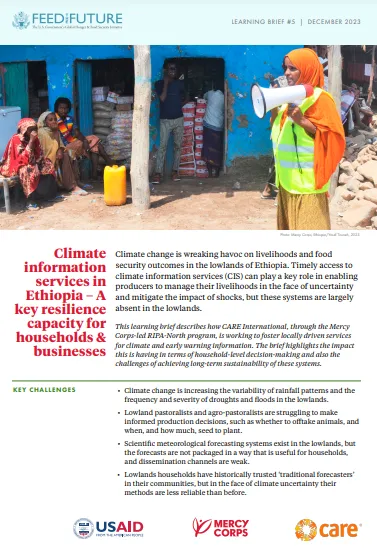
Climate change is wreaking havoc on livelihoods and food security outcomes in the lowlands of Ethiopia. Timely access to climate information services (CIS) can play a key role in enabling producers to manage their livelihoods in the face of uncertainty and mitigate the impact of shocks, but these systems are largely absent in the lowlands. This learning brief describes how CARE International, through the Mercy Corps-led RIPA-North program, is working to foster locally driven services for climate and early warning information. The brief highlights the impact this is having in terms of household-level decision-making and also the challenges of achieving long-term sustainability of these systems.
For 2024 the Water+ team presents the Annual Innovation in Sanitation award to the CARE Zimbabwe Takunda team. The team has worked tirelessly to study and pilot innovative ways, through Human Centered Design, to increase access to toilets among the poorest and most vulnerable people in Zimbabwe. The Takunda team works with Latrine Builders, who are experienced masons, to promote sanitation and increase latrine coverage in the community, while also earning an income. Read more about the sanitation approach of Takunda in the brief below. Read More
This report shares case studies from six countries that detail how advocacy, partnerships, and tailored regulatory frameworks have fostered supportive legal environments for Savings Groups (SGs), promoting their growth, sustainability, and integration into formal financial systems while preserving their essential informality. Read More
Through CARE’s Her Money, Her Life Project, Bakari Shidafa, a husband and father in Tanzania’s Usambara highlands, has become a community advocate for gender equality and shared family responsibilities. Despite physical challenges, Bakari champions joint decision-making and women’s rights, encouraging an inclusive approach to family life and inspiring his village toward greater equity. Read More